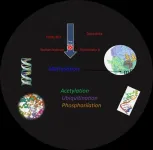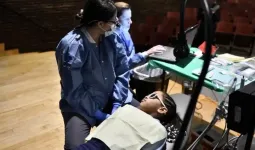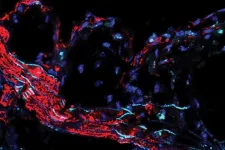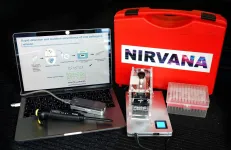(Press-News.org) The pandemic is affecting every country, but not every country has equal access to the lifesaving COVID-19 vaccines. Recent estimates show that high-income countries -- which have just one-fifth of the global adult population -- have purchased more than half of the world's total vaccine doses, resulting in disparities for low- and middle-income countries.
A new study by researchers at Virginia Commonwealth University investigates a key question: Will the U.S. population support donating part of its COVID-19 vaccine stockpile to less prosperous countries?
"COVID-19 is a true global pandemic that has touched every nation on Earth. Borders closed, economic consequences and an incredible level of human suffering, with now more than half a million people who have died of COVID in the U.S. and many more worldwide," said lead author Jeanine Guidry, Ph.D., an assistant professor in the Richard T. Robertson School of Media and Culture in the College of Humanities and Sciences and director of the Media+Health Lab at VCU. "COVID-19 has shown how interconnected we all are, and to defeat it we will need to work together on a global scale."
For the study, "U.S. Public Support for COVID-19 Vaccine Donation to Low- and Middle-Income Countries during the COVID-19 Pandemic," the researchers conducted a survey of 788 U.S. adults that assessed the support of different population groups for donating vaccines, as well as in what quantity and in what time frame.
It found that older respondents were both less likely to endorse higher levels of COVID-19 vaccine donations and were more likely to want to wait until all in the U.S. who want the vaccine have received it.
"We know that while COVID affects everybody, the majority of the people who die from it are people who are older," Guidry said. "So this finding may reflect that vulnerability."
It also found that respondents who identified as Democrats were more likely to endorse more and faster COVID-19 vaccine donations to low- and middle-income countries than Republicans.
"It is possible that those who identify as Democrats were more likely to support higher levels of donation because it may be connected to a belief in health care as a human right and health care for all," Guidry said.
People without health insurance also were less likely to support donation, and wanted to wait until everyone in the U.S. who wants a vaccine has received it.
The study also found that people who rated higher on the "social dominance orientation" scale were both less likely to endorse higher levels of COVID-19 vaccine donations as well as more likely to want to wait until all in the U.S. who want the vaccine have received it. Social dominance orientation is a personality trait measuring a person's support for social hierarchy and belief that their group is superior to others.
"Social dominance orientation may actually be a fundamental driver of support for vaccine donations during the pandemic," said Paul Perrin, Ph.D., a co-author on the study and an associate professor in the Department of Psychology at VCU. "When people believe in their heart that some individuals are inherently better than others and should therefore be afforded more societal privileges, that is a deep worldview that can color many of their other belief systems."
The study's results also have some encouraging signs, said co-author Bernard Fuemmeler, Ph.D., a professor in the Department of Health Behavior and Policy in the VCU School of Medicine.
"Despite some of the differences we observed with respect to age, party affiliation or social dominance, it is encouraging that, for the most part, there was a majority support for donating as much as 10% of vaccines we have available in the U.S. to other countries," he said. "Despite some hesitancy among a minority of the sample, many we surveyed recognized the importance of closing the gap. Policymakers should be encouraged that proposals to donate the vaccine will be met with acceptance."
The study's findings could be valuable to policymakers, health care providers and public health communication professionals working to persuade and target key segments of the U.S. public to support the donation of vaccines to countries that lack the resources to develop and purchase sufficient quantities.
"Our goal is to provide indications about how we can best communicate to the public. How can we best say: 'OK, we need to [donate vaccines] but we want your buy-in. We want your support,'" Guidry said. "Having support for these decisions is going to be critically important. [This study] provides an important starting point."
INFORMATION:
In addition to Guidry, Perrin and Fuemmeler, the study's authors include VCU researchers Kellie Carlyle, Ph.D., an associate professor in the Department of Health Behavior and Policy; Carrie Miller, Ph.D., a postdoctoral fellow in the Department of Health Behavior and Policy; and Mark Ryan, M.D., associate professor in the Department of Family Medicine; as well as Candace Burton, Ph.D, assistant professor at the University of California at Irvine; Linnea Laestadius, Ph.D., an associate professor in the School of Public Health at the University of Wisconsin-Milwaukee; and Emily Vraga, Ph.D., an associate professor in the Hubbard School of Journalism and Mass Communication at the University of Minnesota.
The study is the second to emerge from the researchers' survey findings. The first study, published in December, analyzed Americans' willingness to get a COVID-19 vaccine with and without emergency use authorization.
The new study will be published in the journal Vaccine, published by Elsevier. DOI: https://doi.org/10.1016/j.vaccine.2021.03.027. Copies of the paper are available to credentialed journalists upon request; please contact Elsevier's newsroom at newsroom@elsevier.com or +31 20 485 2719.
Houston Methodist has been a leader in successfully treating high-risk patients with monoclonal antibodies (mAB) for mild to moderate Covid-19 infection. Among the nation's largest providers of mAB therapy, Houston Methodist has infused nearly 4,000 patients since the FDA's Emergency Use Authorization (EUA) was issued. The hospital system was able to quickly ramp up its program once the EUA was granted by leveraging a number of resources through interdisciplinary collaboration.
As more hospitals begin to ramp up for treating Covid-19 with mAB therapy, Houston Methodist's example serves as a valuable model for other medical systems to establish or expand mAB treatment programs and improve patient access to this critical therapy. A commentary outlining the challenges, ...
A team of University of Colorado School of Medicine researchers recently published a paper offering new insight into the role that oxygen deprivation, or hypoxia, plays in cancer development. CU Cancer Center member Joaquin Espinosa, PhD, is the senior researcher on the paper, which he hopes will help lead to more targeted treatments for cancer.
For their paper published this month in the journal Nature Communications, Espinosa and the rest of the team -- Zdenek Andrysik, PhD; Heather Bender, PhD; and Matthew Galbraith, PhD -- used state-of-the-art genomics technologies to map the response of cancer cells to hypoxia with unprecedented detail, ...
Abusive alcohol drinking considerably impacts human health. Alcoholism, better defined as Alcohol Use Disorders (AUD), includes a group of pathological entities related to alcohol-induced damage. Individuals with AUD exhibit compulsive alcohol drinking and negative emotional states when alcohol drinking ceases. In the most severe AUD forms, the individuals lose control over consumption despite a decided will to stop. Some controversial issues have arisen as to whether the definition of AUD can help to delimit and characterize clinical entities related to abusive alcohol ingestion.
The World Health Organization (WHO) reports that approximately 3,3 million people (5,9% of global ...
New findings from a Michigan Medicine study reveal that antibody testing is predictive of prior COVID-19 infection, and rapid screening methods - even from finger pricks - are effective testing tools.
Researchers analyzed antibody tests conducted on more than 500 subjects in patient care settings. They found that people who had COVID, including those with mild symptoms, produced antibodies.
"For a long time, people were very worried that people with mild COVID did not make immune responses," says Charles Schuler, M.D., a clinical assistant professor of allergy and immunology at Michigan Medicine. "This should give people confidence that the tests that are available to them aren't just random number generators. They're actually giving them ...
New "sweat stickers" may streamline the early diagnosis of cystic fibrosis by enabling scientists to easily gather and analyze sweat from the skin of infants and children. The stickers matched the performance of previous, more cumbersome devices when tested with 51 subjects, suggesting the stickers could address design obstacles that have held back the diagnosis and treatment of cystic fibrosis in pediatric patients. Diagnosing cystic fibrosis in infancy or childhood is critical to achieve good outcomes, as current treatments must be given early to extend lifespans and alter the course of the disease. Many current diagnostics work by detecting levels of chloride in sweat, which are elevated in cystic fibrosis patients. However, these tests must often be repeated and use unwieldy wrist-wrapped ...
For many parents, the COVID-19 pandemic has made life's everyday juggling act--managing work, school, extracurricular, and household responsibilities--much, much harder. And according to a new study led by Penn sociologists, those extra burdens have fallen disproportionately on mothers.
The research, shared in the April issue of the journal Gender and Society, investigated how shifts in work and school that arose due to the pandemic triggered changes in the division of labor in families. Using data on two-parent households from a nationwide survey conducted in April 2020, the researchers found that ...
Scientists from the Skoltech Center for Energy Science and Technology (CEST) have developed a method for modeling the behavior of 2D materials under pressure. The research will help create pressure sensors based on silicene or other 2D materials. The paper was published in the ACS Nano journal.
Silicene, which is regarded as the silicon analog of graphene, is a two-dimensional allotrope of silicon. In its normal state, bulk silicon is a semiconductor with a diamond crystal type structure. As it thins down to one or several layers, its properties change dramatically. However, it has not yet been possible to study the change in the electronic properties of 2D materials at high pressure.
Scientists from Russia, Italy, the United ...
In a longitudinal study published earlier this month in the Journal of the American Dental Association, researchers analyzed untreated decay in a cohort of nearly 7,000 children enrolled in the ForsythKids preventive dentistry program. Over the course of six years, the percentage of children with untreated cavities in the program decreased from 39 to 19 percent, suggesting that school-based prevention programs are effective in combating childhood dental disease.
Tooth decay is the most common chronic early childhood disease in the United States. More than half of children aged 6-8 years old have had a cavity, and kids from low-income families ...
High cholesterol is the most commonly understood cause of atherosclerosis, a hardening of the arteries that raises the risk of heart attack and stroke. But now, scientists at Washington University School of Medicine in St. Louis have identified a gene that likely plays a causal role in coronary artery disease independent of cholesterol levels. The gene also likely has roles in related cardiovascular diseases, including high blood pressure and diabetes.
The study appears March 24 in the journal Science Translational Medicine.
Studying mice and genetic data from people, the researchers found ...
LA JOLLA--(March 31, 2021) Clinicians using a new viral screening test can not only diagnose COVID-19 in a matter of minutes with a portable, pocket-sized machine, but can also simultaneously test for other viruses--like influenza--that might be mistaken for the coronavirus. At the same time, they can sequence the virus, providing valuable information on the spread of COVID-19 mutations and variants. The new test, dubbed NIRVANA, was described online today by a multi-institution team of scientists in the journal Med.
"This is a virus detection and surveillance method that doesn't require an expensive infrastructure like other approaches," says Juan Carlos Izpisua Belmonte, co-corresponding author and a professor in Salk's Gene Expression ...





